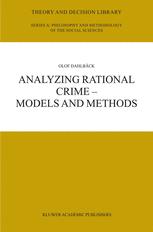

Most ebook files are in PDF format, so you can easily read them using various software such as Foxit Reader or directly on the Google Chrome browser.
Some ebook files are released by publishers in other formats such as .awz, .mobi, .epub, .fb2, etc. You may need to install specific software to read these formats on mobile/PC, such as Calibre.
Please read the tutorial at this link: https://ebookbell.com/faq
We offer FREE conversion to the popular formats you request; however, this may take some time. Therefore, right after payment, please email us, and we will try to provide the service as quickly as possible.
For some exceptional file formats or broken links (if any), please refrain from opening any disputes. Instead, email us first, and we will try to assist within a maximum of 6 hours.
EbookBell Team

4.0
86 reviewsOlof Dahlbäck's book breaks new ground for the analysis of crime from a rationality perspective by presenting models and methods that go far beyond those with which researchers have hitherto been equipped. The book examines single crimes, individual criminality, and societal crime, and it discusses thoroughly the general decision theoretical presuppositions necessary for analyzing these various types of crime. An expected utility maximization model for a single discrete choice regarding the commission of a crime is the foundation of most of the analyses presented. A version of this model is developed that permits interpersonal comparisons, and this basic model is used when deriving more complex models of crime as well as when analyzing the potential for such derivations. The rigorous, powerful methods suggested provide considerable opportunities for improving research and for seeing old problems in a new light.